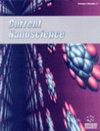NBTI Effect Survey for Low Power Systems in Ultra-nanoregime
IF 1.5
4区 材料科学
Q4 BIOTECHNOLOGY & APPLIED MICROBIOLOGY
引用次数: 0
Abstract
Background: Electronic device scaling with the advancement of technology nodes maintains the performance of the logic circuits with area benefit. Metal oxide semiconductor (MOS) devices are the fundamental blocks for building logic circuits. Area minimization with higher efficiency of the circuits motivates the researchers of very large-scale integration (VLSI) design. Moreover, the reliability of digital circuits is one of the biggest challenges in VLSI technology. A major issue in reliability is negative bias temperature instability (NBTI) degradation. NBTI affects the efficiency and reliability of electronic devices. Method: This paper presents a review of NBTI physical-based mechanisms. NBTI's impact on VLSI circuits and techniques has been studied to mitigate and compensate for the effect of NBTI. Result: This review paper presents an idea to relate the NBTI and leakage mitigation techniques. This study gives an overview of the efficiency, complexity, and overhead of NBTI mitigation techniques and methodologies. Conclusion: This survey provides a brief idea about NBTI degradation by using reliability simulation. Moreover, the extensive aging effect is discussed in the paper.超低功率系统的NBTI效应研究
背景:随着技术节点的进步,电子器件的缩放保持了逻辑电路的性能,具有面积效益。金属氧化物半导体(MOS)器件是构建逻辑电路的基本模块。电路的高效率和面积最小化是超大规模集成电路(VLSI)设计研究的动力。此外,数字电路的可靠性是VLSI技术面临的最大挑战之一。可靠性的一个主要问题是负偏置温度不稳定性(NBTI)退化。NBTI影响着电子设备的效率和可靠性。方法:本文综述了NBTI的物理机制。研究了NBTI对VLSI电路和技术的影响,以减轻和补偿NBTI的影响。结果:本文提出了一种将NBTI与泄漏缓解技术联系起来的思路。本研究概述了NBTI缓解技术和方法的效率、复杂性和开销。结论:本研究通过可靠性仿真对NBTI的退化提供了一个简要的认识。此外,本文还讨论了广泛老化效应。
本文章由计算机程序翻译,如有差异,请以英文原文为准。
求助全文
约1分钟内获得全文
求助全文
来源期刊

Current Nanoscience
工程技术-材料科学:综合
CiteScore
3.50
自引率
6.70%
发文量
83
审稿时长
4.4 months
期刊介绍:
Current Nanoscience publishes (a) Authoritative/Mini Reviews, and (b) Original Research and Highlights written by experts covering the most recent advances in nanoscience and nanotechnology. All aspects of the field are represented including nano-structures, nano-bubbles, nano-droplets and nanofluids. Applications of nanoscience in physics, material science, chemistry, synthesis, environmental science, electronics, biomedical nanotechnology, biomedical engineering, biotechnology, medicine and pharmaceuticals are also covered. The journal is essential to all researches involved in nanoscience and its applied and fundamental areas of science, chemistry, physics, material science, engineering and medicine.
Current Nanoscience also welcomes submissions on the following topics of Nanoscience and Nanotechnology:
Nanoelectronics and photonics
Advanced Nanomaterials
Nanofabrication and measurement
Nanobiotechnology and nanomedicine
Nanotechnology for energy
Sensors and actuator
Computational nanoscience and technology.
 求助内容:
求助内容: 应助结果提醒方式:
应助结果提醒方式:


